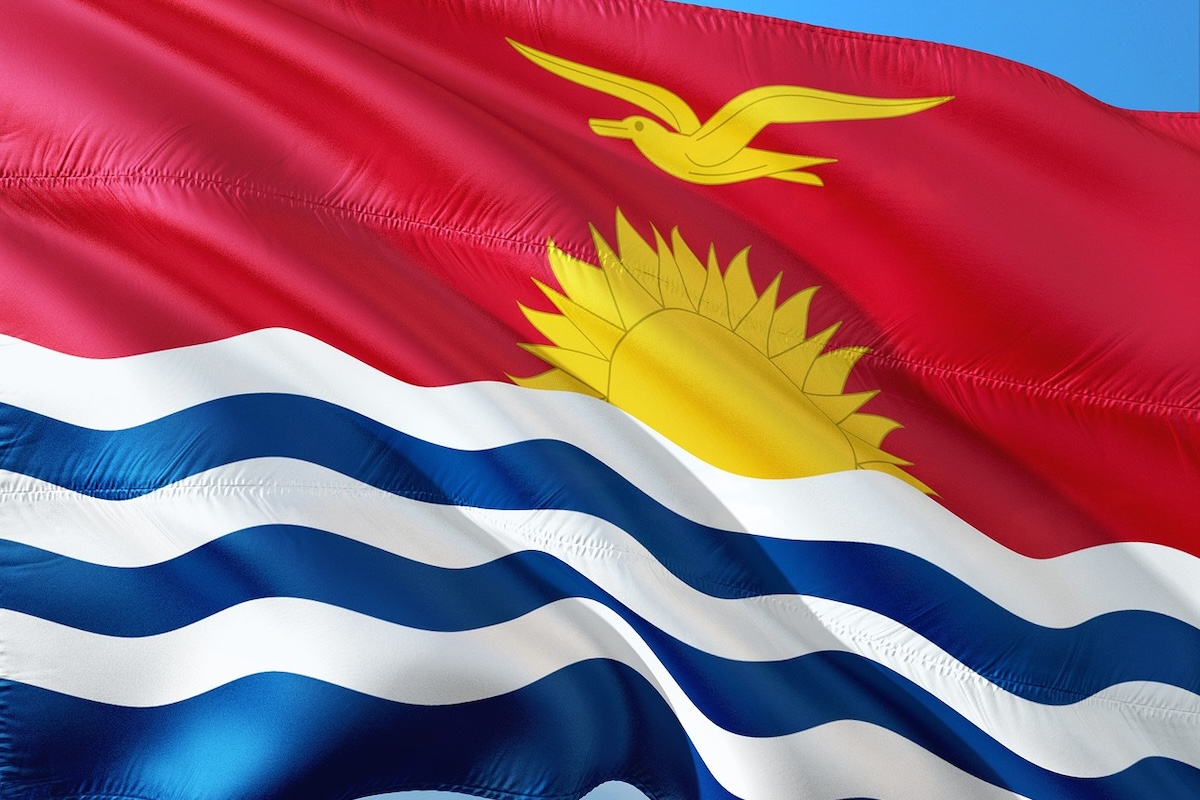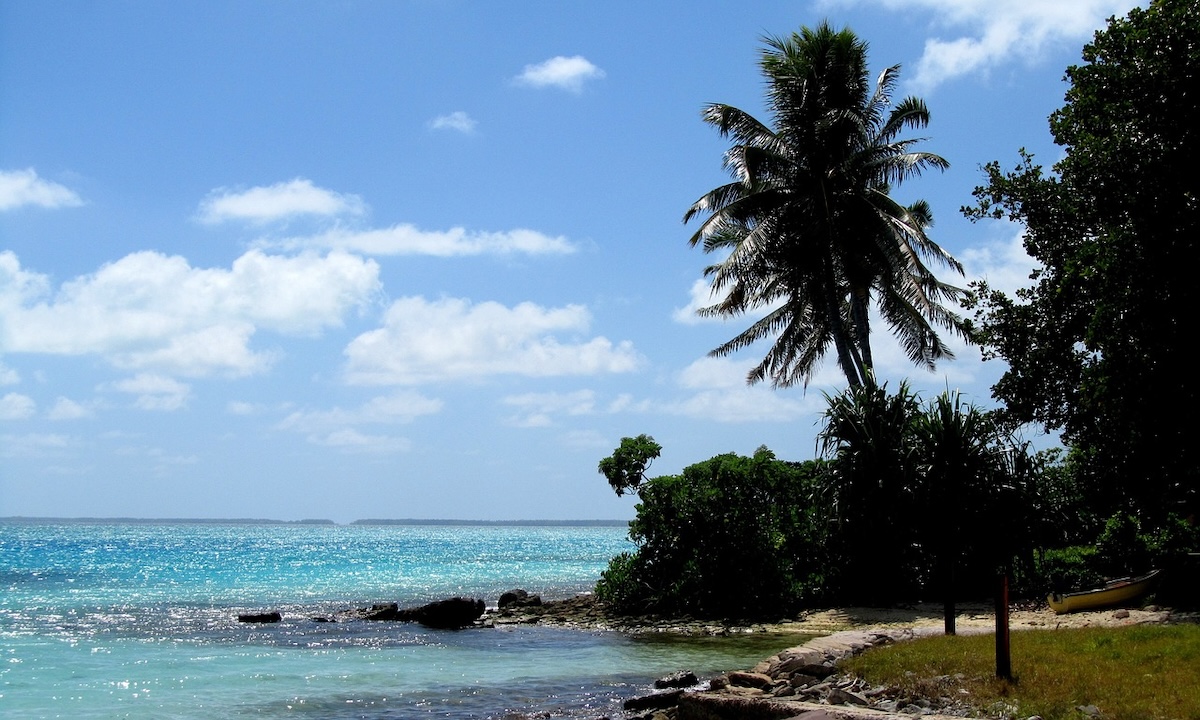
22 Fascinating Facts About Kiribati!
By: Sarah Stone
Skip to Section
Kiribati may be small and remote, but it’s packed with history, culture, and challenges that make it a place like no other. Here are 25 fun facts and interesting tidbits about this island nation!
Unique Pronunciation
The name “Kiribati” is pronounced “Kiribas”, following the local Gilbertese language guidelines.
Spread Out
Kiribati is made up of 32 atolls and one reef island, spread over 3.4 million square kilometers of the Pacific Ocean, making it one of the most dispersed countries in the world.
Time Traveler
Kiribati is the only country in the world to be situated in all four hemispheres—northern, southern, eastern, and western.
Future First
Kiribati is among the first places on Earth to welcome the new day (and the New Year!) since it sits very close to the International Date Line. The nation also has three time zones—Gilbert Island Time, Phoenix Island Time, and Line Islands Time—and is not subjected to the annoyance of daylight saving time.
Historic Lines
Speaking of time zones! Kiribati once straddled the International Date Line, meaning that the Gilbert Islands were technically a full day ahead of its eastern neighbors, the Phoenix and Line Islands. The country’s government opted to move the line on December 31, 1994 about 1,000 kilometers eastward to ensure the entire country shared the same date. This also was the creation of the UTC+13:00 and UTC+14:00 time zones.

Image by Ramona Mona Denton from Pixabay
Independent Spirit
Kiribati gained independence from the United Kingdom on July 12, 1979. Its capital is Tarawa—also its most populous area.
Oceanic Protector
Kiribati established the Phoenix Islands Protected Area (PIPA) in 2008, one of the largest marine protected areas in the world at over 408,000 square kilometers. In 2010, the PIPA was designated a UNESCO World Heritage Site.
Rising Concerns
Due to climate change and rising sea levels, Kiribati faces significant threats of submersion, meaning entire islands of the country could be uninhabitable within decades.
Diverse Languages
While English is one official language of Kiribati, the vast majority of the population speaks Gilbertese—you can also find it spoken in Fiji, the Solomon Islands, New Zealand, and other areas of the Pacific.
Long Island
Kiritimati (also known as Christmas Island—and not to be confused with the Australian territory of the same name!) in Kiribati is one of the world’s largest atolls by land area, covering an area of about 312 square kilometers. It accounts for about 70% of the country’s total land area.
Flag Symbolism
The flag of Kiribati features a golden frigate bird flying over a rising sun and the ocean’s waves. The blue and white wave pattern represents the country’s three archipelagos, while the sun’s 17 rays represent the 16 Gilbert Islands plus the island of Banaba. The sun is depicted as rising over the equator.
Fishing Economy
Kiribati has very few natural resources, and has the lowest GDP out of any sovereign state in Oceania. As such, fishing is the backbone of its economy, with the country earning revenue from the sale of fishing licenses to foreign fleets. As well, Kiribati is a major exporter of ornamental fish, like the flame angelfish.
Scattered Population
Despite its vast oceanic territory, Kiribati has a small population, with around 120,000 people living mostly in the Gilbert Islands.
Cultural Connection
Kiribati’s culture is deeply rooted in community and kinship, with traditional dances playing an important role in social gatherings. Traditional dances emphasize outstretched arms and birdlike movements (echoed in the frigate bird on the country’s flag), and can be done in a standing or sitting position. The traditional dances serve as a form of storytelling rather than entertainment.
No McDonald’s
Kiribati is one of the few countries in the world without a McDonald’s.
Traditional Navigation
Kiribati people have a rich history of navigation using stars, waves, and birds, which they used long before modern maps and GPS.
Catholic Influence
The majority of Kiribati’s population is Christian, of which about 59% are Roman Catholic, reflecting the influence of Western missionaries. The country is secular, and freedom of religion is included in its constitution.
Increased Migration
Many Kiribati citizens are relocating to countries like New Zealand and Australia due to the environmental and existential challenges posed by climate change.
Capital Challenge
South Tarawa, the capital city, is one of the most densely populated areas in the Pacific, with overcrowding leading to issues like limited freshwater and sanitation challenges.
Sparse Tourism
While Kiribati isn’t a major tourist destination, it has quite a bit of untouched beauty, with gorgeous beaches and traditional village life.
Self-Sufficient
Many Kiribati families practice subsistence farming and fishing, living off the land and sea in traditional ways.
Unique Sport
Te Oreano is a traditional sport in Kiribati, where opposing teams will throw a heavy ball to one another, each trying to catch and toss it back without dropping the ball or getting injured.
About the Author
 As the editor-in-chief of Frayed Passport, my goal is to help you build a lifestyle that lets you travel the world whenever you want and however long you want, and not worry about where your next paycheck will come from. I've been to 20+ countries and five continents, lived for years as a full-time digital nomad, and have worked completely remotely since 2015. If you would like to share your story with our community, or partner with Frayed Passport, get in touch with me using the form on our About page.
As the editor-in-chief of Frayed Passport, my goal is to help you build a lifestyle that lets you travel the world whenever you want and however long you want, and not worry about where your next paycheck will come from. I've been to 20+ countries and five continents, lived for years as a full-time digital nomad, and have worked completely remotely since 2015. If you would like to share your story with our community, or partner with Frayed Passport, get in touch with me using the form on our About page.Information published on this website and across our networks can change over time. Stories and recommendations reflect the subjective opinions of our writers. You should consult multiple sources to ensure you have the most current, safe, and correct details for your own research and plans.
Frayed Passport is a participant in the Amazon Associates Program, an affiliate advertising program designed to provide a means for sites to earn advertising fees by advertising and linking to Amazon.com. We also may share links to other affiliates and sponsors in articles across our website.




